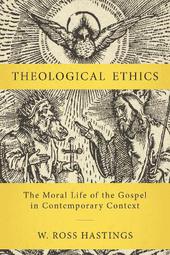
|
Theological Ethics: The Moral Life of the Gospel in Contemporary Context
Hardback
Main Details
| Title |
Theological Ethics: The Moral Life of the Gospel in Contemporary Context
|
| Authors and Contributors |
By (author) W. Ross Hastings
|
| Physical Properties |
| Format:Hardback | | Pages:256 | | Dimensions(mm): Height 238,Width 162 |
|
| Category/Genre | Ethics and moral philosophy
Christian theology
Religious life and practice |
|---|
| ISBN/Barcode |
9780310111955
|
| Classifications | Dewey:241 |
|---|
| Audience | | Tertiary Education (US: College) | |
|---|
|
Publishing Details |
| Publisher |
Zondervan
|
| Imprint |
Zondervan Academic
|
| Publication Date |
18 March 2021 |
| Publication Country |
United States
|
Description
Be Prepared to Think Theologically through Today's Most Pressing Ethical and Moral Issues In Theological Ethics theologian, pastor, and ethicist W. Ross Hastings gives pastors, ministry leaders, and students a guide designed to equip them to think deeply and theologically about the moral formation of persons in our communities, about ethical inquiry and action, and about the tone and content of our engagement in the public square. The book presents a biblical perspective and a gospel-centered framework for thinking about complex contemporary issues in ways are life-giving and that will lead readers into greater flourishing as human persons in community. This book is distinctive in presenting: A framework for theological ethics that is robustly theological and Trinitarian. Ethics isolated from the gospel and theology becomes bad news, but when it is informed by and empowered by participation in the triune God of grace, it is part of the good news of the gospel. An approach to theology and theological ethics that makes the Word of God the ultimate authority and it is therefore grounded in the biblical narrative and texts. An understanding that theological ethics are inherently missional. The church as the image of the triune God makes it the home of ethics, but in light of its missional identity, it will reverberate outwards to engage the world in ways that are humble and not power-mongering, that are gospel-based and shalom-evoking. Theological Ethics is for those who lead churches or ministries (or someday will) and who urgently need deep theological grounding as they daily encounter ethical and moral issues where they need to provide a gracious, truthful, and gospel-directed response.
Author Biography
W. Ross Hastings (Ph.D in Chemistry from Queen's University, Kingston; Pd.D in Theology from the University of St. Andrews, Scotland) is Sangwoo Youtong Chee Professor of Theology and Pastoral Theology at Regent College, Vancouver, B.C. He is author of several books including Missional Church; Jonathan Edwards and the Life of God; and Echoes of Coinherence.
Reviews'In this thoroughly researched volume, Ross Hastings offers a crackling compendium of fundamental theological criteria by which Christians may guide their ethical reflection. The ideas contained within these covers resonate with clear thinking as well as an intriguing engagement with other leading modern theologians, public controversies as well as the biblical sources.' * PAUL ALLEN, academic dean and professor of theology, Corpus Christi College * 'Ethics is never autonomous but always arises from a particular narrative. Hastings cogently argues that Christian ethics must be theological and therefore is Trinitarian, biblical, ecclesial, and missional. A significant contribution to both Christian ethics and theology.' * DENNIS P. HOLLINGER, president emeritus and senior distinguished professor of Christian ethics, Gordon-Conwell Theological Seminary * 'Ross Hastings argues convincingly that Christian ethics must be restored to its status as a profoundly theological discipline. In making the case he offers us excellent perspectives on specific topics in ethics--including some very pressing ones in contemporary life. And there is more: refreshing insights on Trinitarian thought, the church as the locus of moral reflection, the need for grounding theology in careful biblical exposition, and the relationship of morality to spirituality. An impressive and refreshing book!' * RICHARD J. MOUW, president emeritus, Fuller Theological Seminary * 'One of the most damaging legacies of modernity is the extent to which Christian theologians have lost their evangelical nerve when it comes to 'Christian' ethics. Fear of questioning universal epistemic access to the moral law, confused accounts of the conditions for repentance, and a concern to ratify accounts of the state and its laws independently of the gospel have distracted theologians from the recognition at the heart of the faith, namely, that Jesus Christ is the key to understanding the totality of God's purposes for human beings and thereby every facet of their relationship to God and to each other. In this remarkable book, Ross Hastings has the courage to think through the totality of Christian ethics from its centre in the triune God and his radical and liberating engagement with the contingent order in Jesus Christ. Rather than defining ethics with reference to generic assumptions about human purposiveness, it focuses on the one who alone mediates God's creative purposes to humanity and who alone is the true image of God the Father. Consequently, rather than turning to some perceived natural order for guidance, Hastings interprets our obligations in the light of our participation in the new creation and in the life of the new humanity to which the resurrection bears witness. The result is an approach to ethics that is grace-oriented, liberating, and inspirational rather than legalistic--that refuses to reduce Christian ethics to secular humanism in religious guise. This is a courageous, cogent, and convincing account of the radical and distinctive nature of Christian ethics. Not only will it challenge, but it will inspire and excite students, pastors, and theologians alike. What it reminds us is that theological ethics is never more relevant than when it actively witnesses to the gospel of Jesus Christ and interprets its grounds accordingly.' * ALAN J. TORRANCE, emeritus professor, University of St. Andrews *
|